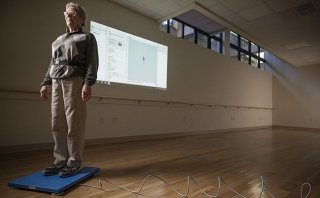Comprehensive Review Highlights Urgent Need for Frailty-Guided Clinical Care in Older Adults
Frailty identified as a key predictor in older adult health care outcomes.
-

Associate Director & Senior Scientist, Hinda and Arthur Marcus Institute for Aging Research
A groundbreaking review published in the New England Journal of Medicine underscores the critical importance of addressing frailty among older adults. Titled “Frailty in Older Adults,” the comprehensive article offers an in-depth analysis of the biological underpinnings of frailty, the necessity of early detection and intervention, and outlines promising future directions for health care professionals.
Authored by Dae Hyun Kim MD, ScD, MPH, founder of the Frailty Research Program at the Hinda and Arthur Marcus Institute for Aging Research at Hebrew SeniorLife and Kenneth Rockwood, MD, MPA, FRCPC, a professor in the Division of Geriatric Medicine, Department of Medicine, Dalhousie University, the review discusses frailty as a condition characterized by diminished physiological reserve and increased vulnerability, significantly impacting the effectiveness and safety of health care interventions. Current management strategies are evolving to be more personalized, addressing the unique needs of older adults on the basis of an assessment of their frailty and its contributors.
“Frailty should be a pivotal consideration in health care planning for the elderly, guiding both preventive and therapeutic decisions,” said Dr. Kim.
The Centers for Medicare and Medicaid Services (CMS), a federal agency providing coverage to more than 160 million people, “recently approved the inclusion of age-friendly hospital measure domains as part of the hospital inpatient quality reporting program. One of the five domains is frailty screening and intervention, which makes our review paper very timely because it essentially covers the latest evidence on how to do frailty screening and interventions,” Dr. Kim added.
Understanding frailty and the urgency of screening and management
Marked by a decline in physiological reserves and an increased vulnerability to stressors, frailty leads to a higher risk of adverse health outcomes. The prevalence of frailty increases with age and is a significant indicator of future disabilities and mortality. Key biological factors contributing to frailty include chronic inflammation, aged cells producing inflammatory molecules (“cellular senescence”), reduced energy production in cells (“mitochondrial dysfunction”), impaired nutrient sensing within cells, and hormonal imbalances, all of which contribute to fatigue, lack of stamina, muscle loss and weakness, and slowing walking speed.
The review highlights the importance of frailty screening and the implementation of tailored interventions to manage frailty effectively. Interventions, such as nutritional support, physical exercise programs, and comprehensive geriatric assessments, have been shown to improve patient outcomes. Moreover, assessing frailty before stressful treatments like surgery or chemotherapy can help identify suitable candidates and optimize health status to improve treatment outcomes. The authors advocate for integrating frailty assessments into routine clinical practice, allowing health care providers to personalize care plans and allocate resources more effectively.
Innovative interventions and future directions
Drs. Kim and Rockwood summarize the latest evidence on several interventions to manage frailty, including exercise regimens to improve strength and mobility, nutritional strategies to enhance muscle mass and function, and medication review and optimization. They also discuss the need for further research to investigate the potential of big data-driven approaches to enhance frailty screening and collaborative care models, such as geriatric cardiology, geriatric oncology, and geriatric surgery, to improve safety and health outcomes in hospitalized patients.
The authors conclude by calling for a multidisciplinary approach to frailty care involving collaboration between geriatricians, primary care physicians, physical therapists, and dietitians. By fostering an environment of proactive health management, the health care system can better address the needs of an aging population.
Dr. Kim highlights the significance of this research, stating, “Our goal is to provide a vital resource that helps health care professionals, caregivers, and policymakers better understand and manage frailty, ultimately improving outcomes for older adults. With the elderly population steadily increasing, the findings of this review are expected to shape the future of health care policies and practices for older adults.”
About Hebrew SeniorLife
Hebrew SeniorLife, an affiliate of Harvard Medical School, is a national senior services leader uniquely dedicated to rethinking, researching, and redefining the possibilities of aging. Hebrew SeniorLife cares for more than 4,500 seniors a day across campuses throughout Greater Boston. Locations include: Hebrew Rehabilitation Center-Boston and Hebrew Rehabilitation Center-NewBridge in Dedham; NewBridge on the Charles, Dedham; Orchard Cove, Canton; Simon C. Fireman Community, Randolph; Center Communities of Brookline, Brookline; Jack Satter House, Revere; and Leyland Community, Dorchester. Founded in 1903, Hebrew SeniorLife also conducts influential research into aging at the Hinda and Arthur Marcus Institute for Aging Research, which has a portfolio of more than $98 million, making it one of the largest gerontological research facilities in the U.S. in a clinical setting. It also trains more than 500 geriatric care providers each year. For more information about Hebrew SeniorLife, visit our website or follow us on our blog, Facebook, Instagram, Threads, and LinkedIn.



